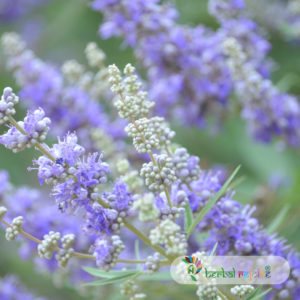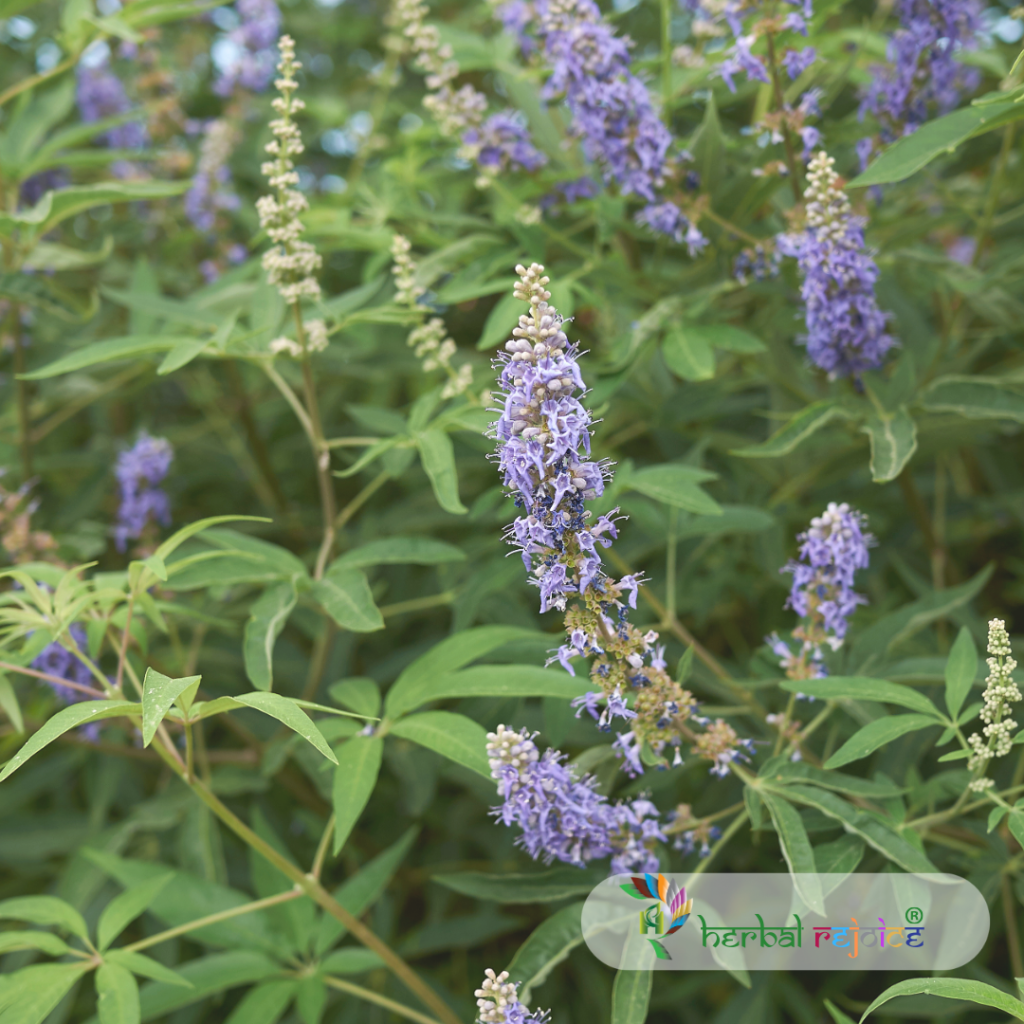Introduction
Monk’s Pepper-Tree, scientifically known as Vitex agnus-castus Linn., is a medicinal plant belonging to the Verbenaceae family. It is native to the Mediterranean region and Southwest Asian countries, including Pakistan. This article will explore the various traditional uses, action, and benefits of Monk’s Pepper-Tree, also known as Hemp tree, in Ayurvedic and Unani medicine. Additionally, we will delve into its significance in regulating hormones, managing menstrual irregularities, and addressing premenstrual symptoms.
Traditional Uses in Ayurveda and Unani Medicine
In Ayurveda, Monk’s Pepper-Tree is referred to as Renukaa or Harenukaa, highlighting its importance as a medicinal seed. These seeds are considered synonyms in Indian medicine and have been traditionally used for their powerful healing properties. Similarly, in Unani medicine, Monk’s Pepper-Tree is known as Sambhaalu and has been utilized for its therapeutic benefits.

Action and Benefits
The dried ripe fruit of Monk’s Pepper-Tree has been found to have a significant impact on the anterior pituitary gland. It helps to reduce follicle-stimulating hormone (FSH) levels while increasing luteinizing hormone (LSH) levels. Additionally, this herb stimulates the production of progesterone by reducing estrogen levels, making it effective in treating primary and secondary corpus luteum deficiency.
Monk’s Pepper-Tree has been widely used for managing various women’s health issues, including premenstrual syndrome (PMS), irregular menstrual cycles, and bleeding between periods. Its hormone-balancing properties make it an excellent choice for regulation and alleviation of premenstrual symptoms.
Furthermore, Monk’s Pepper-Tree has been known to aid in the production and secretion of breast milk, making it a valuable galactagogue for nursing mothers. It also has properties that support bust development.
In addition to its benefits for women’s health, Monk’s Pepper-Tree has also been used to address conditions such as premature old age due to sexual excess, nervous debility, and impotence. It has even been used as a homoeopathic drug to improve sexual performance in males with hyperprolactinemia.
Scientific Evidence and Active Compounds:
Scientific studies have shown that Monk’s Pepper-Tree contains various active compounds that contribute to its medicinal properties. The methanolic extract of the flowering stems of Vitex agnus-castus has been found to contain iridoids, including angnucastoside-A, B, and C. These compounds, along with aucubin, agnuside, mussaenosidic acid, 6-O-p-hydroxybenzoylmussaenosidic acid, and phenylbutenone glucoside, have been identified in the herb.
Among the important compounds found in Monk’s Pepper-Tree are dopaminergic compounds, which have been clinically proven to improve symptoms of premenstrual mastodynia and other premenstrual syndrome symptoms. These compounds play a vital role in hormone regulation and can help alleviate discomfort and pain associated with menstrual irregularities.
Additionally, it is worth noting that Monk’s Pepper-Tree may counteract the effects of birth control pills. Therefore, it is essential to consult with a healthcare professional before combining the herb with any hormonal contraceptives.
Conclusion
Monk’s Pepper-Tree, with its scientific name Vitex agnus-castus Linn., has a long history of traditional use in Ayurvedic and Unani medicine. Its ability to regulate hormones, alleviate menstrual irregularities, and manage premenstrual symptoms makes it a valuable herbal remedy for women’s health. The active compounds found in the herb, including iridoids and dopaminergic compounds, contribute to its therapeutic properties. However, it is advisable to seek guidance from a healthcare professional before incorporating this herb into your routine, especially if you are taking hormonal medications. Embrace the natural power of Monk’s Pepper-Tree for better hormonal balance and improved well-being!
Frequently Asked Questions
What is Monk’s Pepper-Tree?
Monk’s Pepper-Tree, scientifically known as Vitex agnus-castus Linn., is a medicinal plant native to the Mediterranean region and Southwest Asian countries.
What are the traditional uses of Monk’s Pepper-Tree in Ayurveda and Unani medicine?
In Ayurveda and Unani medicine, Monk’s Pepper-Tree has been used for its healing properties, including hormonal regulation, menstrual irregularities, and premenstrual symptoms.
How does Monk’s Pepper-Tree regulate hormones?
Monk’s Pepper-Tree helps to reduce follicle-stimulating hormone (FSH) levels while increasing luteinizing hormone (LSH) levels. It also stimulates progesterone production by reducing estrogen levels.
What are the benefits of Monk’s Pepper-Tree?
Monk’s Pepper-Tree has been used to manage premenstrual syndrome (PMS), irregular menstrual cycles, bleeding between periods, and support breast milk production in nursing mothers. It also supports bust development.
Can Monk’s Pepper-Tree be used for conditions other than women’s health issues?
Yes, Monk’s Pepper-Tree has been used to address conditions such as premature old age due to sexual excess, nervous debility, impotence, and even as a homoeopathic drug to improve sexual performance in males with hyperprolactinemia.
What active compounds are found in Monk’s Pepper-Tree?
Monk’s Pepper-Tree contains compounds such as iridoids, including angnucastoside-A, B, and C, aucubin, agnuside, mussaenosidic acid, 6-O-p-hydroxybenzoylmussaenosidic acid, and phenylbutenone glucoside.
How do the active compounds in Monk’s Pepper-Tree contribute to its medicinal properties?
The active compounds in Monk’s Pepper-Tree, specifically dopaminergic compounds, have been clinically proven to improve symptoms of premenstrual mastodynia and other premenstrual syndrome symptoms.
Can Monk’s Pepper-Tree counteract the effects of birth control pills?
Yes, Monk’s Pepper-Tree may counteract the effects of birth control pills. It is essential to consult with a healthcare professional before combining the herb with any hormonal contraceptives.
Is Monk’s Pepper-Tree safe to use?
Monk’s Pepper-Tree is generally safe to use. However, it is advisable to seek guidance from a healthcare professional before incorporating the herb into your routine, especially if you are taking hormonal medications.
Can Monk’s Pepper-Tree be used during pregnancy?
It is best to avoid using Monk’s Pepper-Tree during pregnancy unless under the guidance of a healthcare professional.
Is Monk’s Pepper-Tree suitable for breastfeeding mothers?
Monk’s Pepper-Tree has been used as a galactagogue to support the production and secretion of breast milk in nursing mothers.
Can Monk’s Pepper-Tree be used by men?
Yes, Monk’s Pepper-Tree has been used to improve sexual performance and address conditions such as impotence in men.
Can Monk’s Pepper-Tree be used by menopausal women?
Yes, Monk’s Pepper-Tree has been used to manage symptoms of menopause, including hormonal imbalances.
Is Monk’s Pepper-Tree addictive?
No, Monk’s Pepper-Tree is not addictive.
Are there any side effects of using Monk’s Pepper-Tree?
Some individuals may experience mild side effects such as digestive upset or skin reactions. It is advisable to consult with a healthcare professional if you experience any adverse reactions.
Can Monk’s Pepper-Tree be used as a standalone treatment for hormonal imbalances?
Monk’s Pepper-Tree can be used as part of a holistic approach to hormonal balance, but it is best to consult with a healthcare professional for a personalized treatment plan.
Can Monk’s Pepper-Tree be used by individuals with hormonal disorders?
Monk’s Pepper-Tree may be beneficial for individuals with hormonal disorders, but it is important to work with a healthcare professional for appropriate dosage and monitoring.
How long does it take to see results from using Monk’s Pepper-Tree?
The time it takes to see results may vary depending on the individual and the specific condition being treated.


